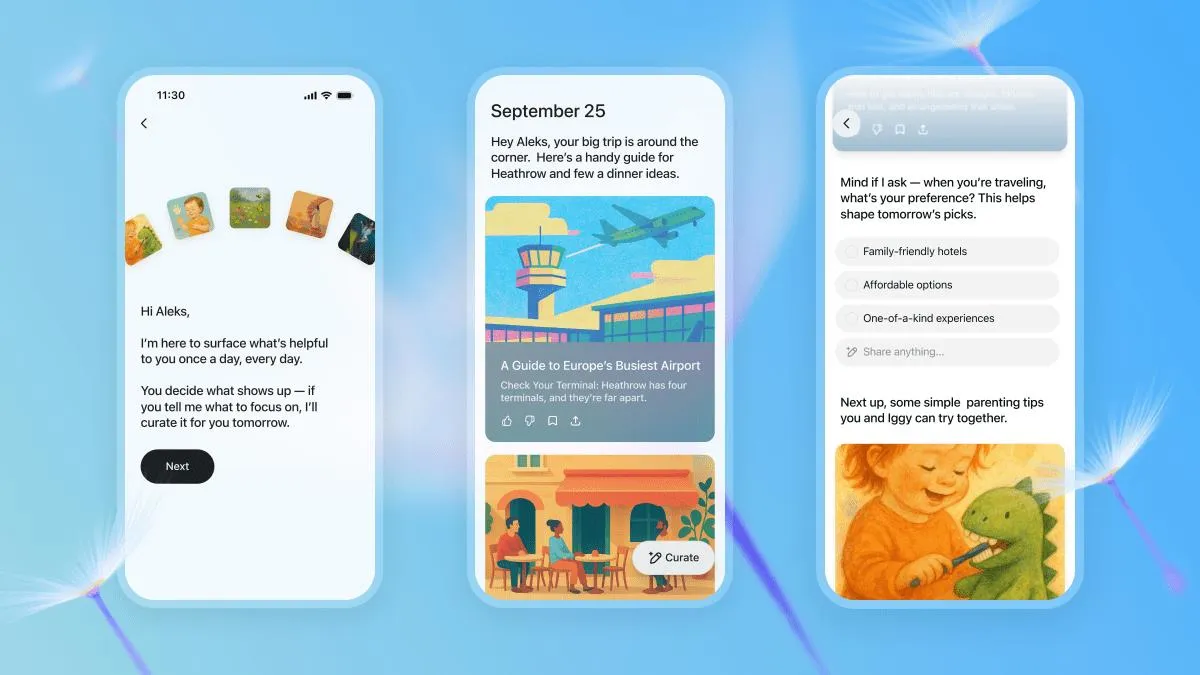
OpenAI has introduced a groundbreaking feature within ChatGPT called Pulse, designed to generate personalized reports for users while they sleep. This innovative function aims to provide users with five to ten concise briefs every morning, ensuring that they are informed and ready to tackle the day ahead. Pulse encourages users to check ChatGPT first thing in the morning, similar to how they would typically engage with social media or news applications.
Pulse is part of a larger transformation in OpenAI's consumer products. Recently, the company has been focusing on developing features that cater to users asynchronously instead of merely responding to direct inquiries. Features such as ChatGPT Agent and Codex aim to enhance the user experience by making ChatGPT feel more like a personal assistant rather than just a chatbot. With Pulse, OpenAI takes a significant step towards making ChatGPT more proactive in its interactions.
Fidji Simo, OpenAI’s new CEO of Applications, expressed the company’s vision in a recent blog post: “We’re building AI that lets us take the level of support that only the wealthiest have been able to afford and make it available to everyone over time.” He highlighted that ChatGPT Pulse is the first step in this direction, currently available to Pro users, with plans to extend access to all users in the future.
OpenAI CEO Sam Altman mentioned that some of the new compute-intensive products, including Pulse, would be exclusive to the company’s premium subscription plan. Due to the limited number of servers available to support ChatGPT, OpenAI is rapidly expanding its AI data centers in collaboration with partners like Oracle and SoftBank to enhance capacity.
Starting Thursday, OpenAI will begin rolling out Pulse to subscribers of its $200-a-month Pro plan. For these users, Pulse will be accessible as a new tab in the ChatGPT app. While the company intends to expand access to all ChatGPT users eventually, it plans to prioritize efficiency before broadening availability, with Plus subscribers anticipated to gain access soon.
Pulse can generate various reports, including roundups of news articles focused on specific topics, such as updates on a favorite sports team, as well as personalized briefs tailored to the user's context. In a demonstration for TechCrunch, OpenAI product lead Adam Fry showcased several reports generated by Pulse. These included a news roundup about the British soccer team Arsenal, group Halloween costume suggestions for his family, and a toddler-friendly travel itinerary for an upcoming trip to Sedona, Arizona. Each report is presented as a visually appealing “card” featuring AI-generated images and text, allowing users to delve deeper into the content by clicking on the cards.
While Pulse will proactively generate some reports, users can also request new automated reports or provide feedback on existing ones. A key aspect of Pulse is its design choice to limit daily outputs, concluding with a message: “Great, that’s it for today.” This intentional feature sets Pulse apart from engagement-driven social media platforms.
Pulse is compatible with ChatGPT’s Connectors, enabling users to link applications like Google Calendar and Gmail. Once integrated, Pulse can analyze emails overnight to highlight essential messages or access the calendar to create an agenda for upcoming events. Additionally, if users have ChatGPT’s memory features activated, Pulse will utilize context from previous chats to enhance the relevance of its reports.
OpenAI’s personalization lead, Christina Wadsworth Kaplan, illustrated how Pulse adapts to individual preferences. For instance, it created a running itinerary for her upcoming trip to London, reflecting her passion for running. As a pescatarian, she noted how Pulse assists in making dinner reservations and finding suitable menu options aligned with her dietary choices.
Despite its capabilities, Pulse may face competition from established news products such as Apple News, paid newsletters, and traditional journalism outlets. Fry does not foresee Pulse replacing users’ existing news applications, as the feature appropriately cites its sources and provides links, similar to ChatGPT Search.
The efficiency of Pulse concerning computational power is still under assessment. Fry indicated that the service's resource consumption can vary significantly based on the complexity of tasks, with some requiring extensive web searches and document synthesis.
Looking ahead, OpenAI aims to enhance Pulse's functionality to the point where it could autonomously make restaurant reservations or draft emails for user approval. However, achieving such advanced capabilities would necessitate substantial improvements in OpenAI’s agentic models, and it may take time before users are comfortable entrusting such decisions to AI.